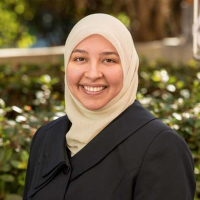Exploring Culturally Competent Care: Addressing Unique Mental Health Needs in Muslim Populations
This workshop aims to provide clinicians with the knowledge and framework to better address the needs of their Muslim clients.
Presenter: Dr Rania Awaad (USA)
NZPsS Member: $60; NZPsS Student: $30; Non-Member: $100
This event will be recorded and the link will be sent to all paid registrants afterwards. Please note that registrations have to be paid in full before the event takes place.
Spirituality and religion can play a significant role in the promotion of health for clients from faith communities, yet these aspects of our clients' identity are often not integrated into their care. For example, many Muslim Americans believe their mental health issues may be linked to spiritual or metaphysical causes and seek clinicians to incorporate spirituality and religion into their treatment plans. However, current literature suggests that clinicians often feel inadequate at integrating religious and spiritual nuances into patient care. This workshop aims to provide clinicians with the knowledge and framework to better address the needs of their Muslim clients. To facilitate this goal, this workshop will include research-informed, key concepts in improving clinical rapport with Muslim clients. Participants will leave this training with improved competency, comfort, and skill in meaningfully providing whole-person care for their Muslim clients.
Learning Objectives
Clinicians and other attendees who are taking this workshop will:
- Be introduced to Islamic Psychology, Muslim mental health, and the demographic portrait of
- Muslims
- Learn about common topics of concern and mental health challenges unique to Muslim
- populations
- Describe the issues that marginalized Muslim patients face, including discrimination on the basis
- of ethnicity, cultural background, or faith
- Understand the utilization of spiritual and religious skills, resources, and practices indigenous to
- the Islamic faith
- Apply their learnings to case studies for practical application of knowledge
References
Awaad, R., El-Gabalawy, O., & Jackson-Shaheed, E. (2021, September 1). Suicide attempts of Muslims compared with other religious groups in the US. JAMA Psychiatry. Retrieved December 12, 2022, from https://jamanetwork.com/journals/jamapsychiatry/fullarticle/2782161
Awaad, R., Fisher, A. J., Ali, S., & Rasgon, N. (2019). Development and validation of the Muslims’ perceptions and attitudes to mental health (M-PAMH) scale with a sample of American Muslim women.J ournal of Muslim Mental Health, 13(2). https://doi.org/10.3998/jmmh.10381607.0013.205
Awaad, R., & Ali, S. (2015). Obsessional disorders in Al-Balkhi′s 9th century treatise: Sustenance of the body and Soul.
Journal of Affective Disorders, 180, 185 -189. https://doi.org/10.1016/j.jad.2015.03.003
Awaad, R., & Ali, S. (2016). A modern conceptualization of phobia in Al-Balkhi’s 9th century treatise: Sustenance of the body and soul. Journal of Anxiety Disorders, 37, 89–93.https://doi.org/10.1016/j.janxdis.2015.11.003
Furqan, Z., Awaad, R., Kurdyak, P., Husain, M. I., Husain, N., & Zaheer, J. (2019, May 2). Considerations for clinicians treating Muslim patients with psychiatric disorders during Ramadan. The Lancet Psychiatry. Retrieved December 12, 2022, from https://www.thelancet.com/journals/lanpsy/article/PIIS2215-0366(19)30161-0/fulltext
Padela, A. I., & Auda, J. (2020). The Moral Status of Organ Donation and Transplantation Within Islamic Law: The Fiqh Council of North America’s Position. Transplantation Direct, 6(3). https://doi.org/10.1097/TXD.0000000000000980
PRESENTER: DR RANIA AWAAD
Dr. Rania Awaad M.D., is a Clinical Associate Professor of Psychiatry at the Stanford University School of Medicine where she is the Director of the Stanford Muslim Mental Health & Islamic Psychology Lab as well as Stanford University's Affiliate Chaplain. In the community, she serves as the Executive Director of Maristan.org, a holistic mental health nonprofit serving Muslim communities, and the Director of The Rahmah Foundation, a non-profit organization dedicated to educating Muslim women and girls. In addition, she is faculty of Islamic Psychology at Cambridge Muslim College and The Islamic Seminary of America. She is also a Senior Fellow for Yaqeen Institute and the Institute of Social Policy and Understanding. Prior to studying medicine, she pursued classical Islamic studies in Damascus, Syria, and holds certifications (ijaza) in the Qur’an, Islamic Law, and other branches of the Islamic Sciences. Follow her @Dr.RaniaAwaad
